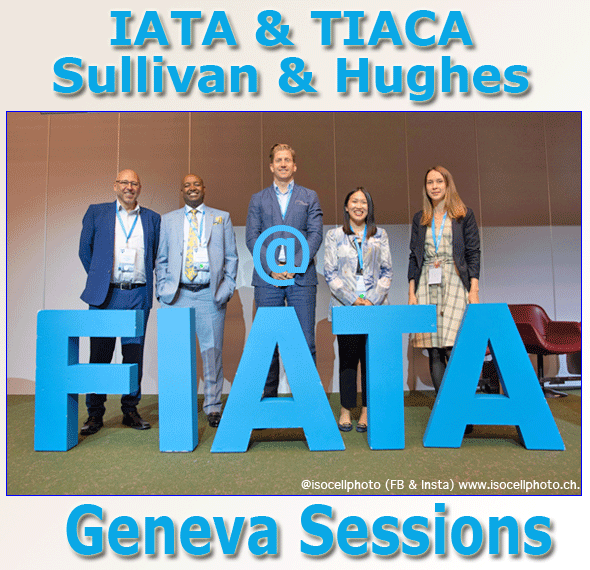 |
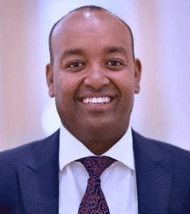 On
May 18th Dawit Woubishet, (left) the Ethiopian chairperson of
the FIATA Air Freight Institute, introduced the themes of his session,
'Business Recovery (eCommerce, Digitalisation, COVID, etc.)' and 'Pre-Loading
Advance Cargo Information (PLACI)', hosting a high-rank panel of speakers:
James Hookham, Secretary-General, GSF, Glyn Hughes, Director General,
TIACA, Brendan Sullivan, Global Head, Cargo, IATA and Cortney Robinson
of ICAO, gathered in Geneva or participating from remote at the first
face to face reunion of the FIATA community after the FWC in Cape Town
in 2019. On
May 18th Dawit Woubishet, (left) the Ethiopian chairperson of
the FIATA Air Freight Institute, introduced the themes of his session,
'Business Recovery (eCommerce, Digitalisation, COVID, etc.)' and 'Pre-Loading
Advance Cargo Information (PLACI)', hosting a high-rank panel of speakers:
James Hookham, Secretary-General, GSF, Glyn Hughes, Director General,
TIACA, Brendan Sullivan, Global Head, Cargo, IATA and Cortney Robinson
of ICAO, gathered in Geneva or participating from remote at the first
face to face reunion of the FIATA community after the FWC in Cape Town
in 2019.
Sadly, due to COVID restrictions it had
not been possible for the most ethnicity and gender varied global assembly
in transport and logistics to meet in person since the autumn of 2019.
FIATA is the largest organisation in freight transport in the world, with
one continent missing: Antarctica. Freight forwarders deal with shipments
in all modes of transport, but are principal facilitators of airfreight
and without their contribution there would be little on our tables and
in our houses.
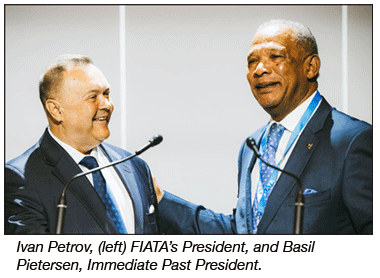 Familiar faces, dear friends were there,
still in smaller numbers than usual, if you count the participants at
the state of the art Geneva convention centre, but really in larger numbers
if you consider the remotely connected participants, with a hybrid format
that deployed 3+ days of stimulating and at times even emotional convention.
It was like a refreshing spring shower after a long drought. The expression
on the faces of Ivan Petrov, FIATA’s President, and Basil Pietersen,
his immediate predecessor, just published on the FIATA website leave no
doubt on this point. The smooth and flawless operation of the HQ team
in Geneva, who admittedly met its own membership base face to face for
the first time after the move from Zurich, was perceptible and contributed
to the spotless hybrid mode discussion that is in my view a feature FIATA
should be proud of.
Familiar faces, dear friends were there,
still in smaller numbers than usual, if you count the participants at
the state of the art Geneva convention centre, but really in larger numbers
if you consider the remotely connected participants, with a hybrid format
that deployed 3+ days of stimulating and at times even emotional convention.
It was like a refreshing spring shower after a long drought. The expression
on the faces of Ivan Petrov, FIATA’s President, and Basil Pietersen,
his immediate predecessor, just published on the FIATA website leave no
doubt on this point. The smooth and flawless operation of the HQ team
in Geneva, who admittedly met its own membership base face to face for
the first time after the move from Zurich, was perceptible and contributed
to the spotless hybrid mode discussion that is in my view a feature FIATA
should be proud of.
The usual report on six months’ activities
was read briefly and it took note of the changes intervened in the Air
Cargo Programmes in the meantime, including those registered at 83rd session
of the IFCC, where items of interest had been submitted to IATA for consideration.
Training centres’ activity and block chain tools, as well as the
new ICAO FIATA agreement on training were mentioned. Then a series of
online polls started and ignited a lively and open debate which kept a
reasonable balance between cliché and insightful thinking about
future trends.
The discussion was ignited by the following
question: “what is the most important lesson learned for the airfreight
industry from the COVID-19 pandemic over the past two years?”
  The
panel instantly noted FIATA members’ replies captured by interactive
ICT tools: Glyn Hughes (left) said: “these guys have all
the answers” mentioning the keywords emerging from the poll. Brendan
Sullivan (right) contended that “cooperation is the keyword”.
They both reflected on how do we take lessons learnt forward from there
and “probably there will be a new different rather than a new normal.
The global economy seems to start evolving more rapidly than ever”
were statements that passed unchallenged. The
panel instantly noted FIATA members’ replies captured by interactive
ICT tools: Glyn Hughes (left) said: “these guys have all
the answers” mentioning the keywords emerging from the poll. Brendan
Sullivan (right) contended that “cooperation is the keyword”.
They both reflected on how do we take lessons learnt forward from there
and “probably there will be a new different rather than a new normal.
The global economy seems to start evolving more rapidly than ever”
were statements that passed unchallenged.
As I said, the debate was interesting and
informative, but I have to warn the reader that this is not a five minutes’
browse. I recommend reading on if you are really interested in the details
of the interactions among the exceptional panel of speakers and their
inspirational thoughts. I must also state that I tried to capture the
debate with best intentions and my approach has been to actually repeat
some of the statements made by the distinguished panellists. If they feel
I have either misunderstood or misinterpreted any of their statements,
I shall be pleased to stand corrected and provide an update.
 James
Hookham (left) expressed his view on the second question (see
below): “It does not surprise me. Recovery is bound to happen, the
trading environment needs more cooperation, as shippers and forwarders
are noting, not only in maritime, but also in air cargo. How much passenger
flow is going to come back, so that the capacity of the belly hold can
return?” was the open question, no undisputable answers instantly
available. James
Hookham (left) expressed his view on the second question (see
below): “It does not surprise me. Recovery is bound to happen, the
trading environment needs more cooperation, as shippers and forwarders
are noting, not only in maritime, but also in air cargo. How much passenger
flow is going to come back, so that the capacity of the belly hold can
return?” was the open question, no undisputable answers instantly
available.
“Can the speakers reflect on what
happened in the last two years?” was the unavoidable following question
from the Chair. Cortney Robinson replied that “there are two big
trends: digitization is in second gear now, with contactless and multimodal
exchange of documents. There is a regulatory side that needs to be developed,
so a task force to work with the aviation community has been established.”
Brendan Sullivan affirmed that air cargo continues to be an industry where
there is a lot of change and challenge. “Digitization
will help us in many areas, such as security with a view to sharing the
SC process information. Fuel is and will still be a challenge. Domestic
travel is coming back, in 2023 there is expectation to go past 2021 figures,
but internationally it will only happen in 2025. Air cargo has shown it
can adapt extremely quickly.”
Glyn Hughes sounded extremely happy to be
back at FIATA in his new function: “What a pleasure to be back here
with you guys! We do not do enough for thanking people in the industry…
Freight forwarders were moving PPD’s struggling with something nobody
knew. By 2025 cargo will probably be over 25% the level of 2019, so the
role of the freighter is going to be crucial going forward.” He
then asked a daring question that three years earlier would have sounded
taboo: “Shall airlines fly people in future where the cargo needs
to move?” Asking for regulations to support also cargo, not only
passengers: “Cargo needs different regulatory rules than passenger
and going forward we need to look at it” and continued: “I
love numbers: in comparative values of tourism and cargo, 850 billion
dollars were spent to promote airborne tourism, but cargo was eight times
as valuable, and yet we see no ads and videos . . . In future we need
to make known that the value of air cargo helps economies prosper.”
This concept ran deep into the hearts of the freight forwarding community
present in the hall and on-line. James Hookham observed for the shippers
that the ability and the speed to react to the pandemic was phenomenal
and noticeable. The responsiveness of the regulatory environment was also
unprecedented and a tribute on how IATA responded should be made, he concluded.
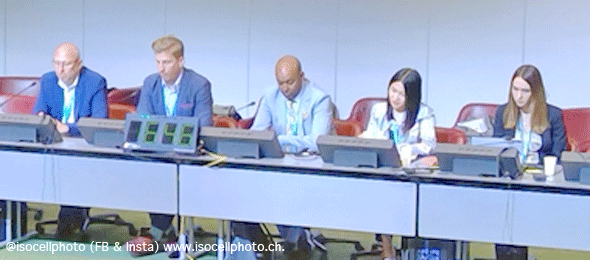 |
The Chair then asked one more crucial
question: “How can we help regions in this transition?” For
organisations deeply regionalised, and yet united, as both FIATA and IATA
are, this is a topic second to none. Glyn Hughes observed that “we
must recognise that COVID is not over yet and some parts will be disrupted
for some more time. We should be flexible to adapt and avoid expecting
a uniform recovery. Elements of disruption become more numerous and fragmented,
so we need to use flexibility; stress is still inevitable.” In reality
flexibility was indeed the so far overlooked and first in line key word
submitted at the poll.
However, Brendan Sullivan contended that
we need a harmonised approach in the regulatory approach, and that is
still a challenge. Forwarders and airlines move vaccines and other crucial
products: our picture has changed in a way that reconnecting some areas
to the rest is no easy task. In levelling the inequalities and keeping
the UN SDG in sight, the rank of the values at play may vary.
The Chairman asked about the next generation.
Glyn registered that air cargo is in the same boat as other businesses:
there is a scarcity of staff and the paradigm must change. We compete
with other high tech, more glamourous industries, but here you can make
an impact, he said. “I hate the word sexy” as others employers
often refer regarding their employment. “This is about creating
value and benefits, we need to use the vehicles of the new generation
to convey the message, to attract the next generation.” Brendan
Sullivan said that “if you wish to attract the new generation, they
know what eCommerce is and we need to attract them by explaining that
we do not need them just to pick up boxes. There is a skill shortage and
we need to play some catch up.”
 Cortney
Robinson (left) echoed implying that the challenge is also explaining
how innovation and automation can help work from remote. Providing the
innovation environment and the benefits that other industries have will
be fundamental. Cortney
Robinson (left) echoed implying that the challenge is also explaining
how innovation and automation can help work from remote. Providing the
innovation environment and the benefits that other industries have will
be fundamental.
 There was then a long, informative and at times challenging Q&A. Galo
Molina, (right) Treasurer of FIATA asked: “what do you
think of liners into the air cargo sector?” Glyn Hughes replied
that he was pleased to see this, as this is a great endorsement for air
cargo. Air cargo will be a lifeline for African countries now, but Glyn
also contended that if the new entrants wished to bypass the forwarder
that would make a mistake. The role of the freight forwarder is still
insufficiently understood, there is a phenomenal amount of global knowledge
in the forwarding sector that cannot be improvised or duplicated.”
Brendan Sullivan observed that “ecommerce will make us all better,
we need to continually adapt” and accepted that “there are
efficiency gains that cannot be achieved without FF’s.” Cortney
Robinsons said that the COO of a shipping line came to talk to ICAO and
the call was on innovation. “They are open to look at technology
and make investments”, he concluded. James Hookham sounded slightly
more worried in saying that “these entities are buying entire parts
of the supply chain and one should be careful to understand what part
of these organisations one is dealing with. They do preferentially go
after beneficial cargo… in making such investments their interest
is to reassure customers that they have alternatives in times of stress.”
There was then a long, informative and at times challenging Q&A. Galo
Molina, (right) Treasurer of FIATA asked: “what do you
think of liners into the air cargo sector?” Glyn Hughes replied
that he was pleased to see this, as this is a great endorsement for air
cargo. Air cargo will be a lifeline for African countries now, but Glyn
also contended that if the new entrants wished to bypass the forwarder
that would make a mistake. The role of the freight forwarder is still
insufficiently understood, there is a phenomenal amount of global knowledge
in the forwarding sector that cannot be improvised or duplicated.”
Brendan Sullivan observed that “ecommerce will make us all better,
we need to continually adapt” and accepted that “there are
efficiency gains that cannot be achieved without FF’s.” Cortney
Robinsons said that the COO of a shipping line came to talk to ICAO and
the call was on innovation. “They are open to look at technology
and make investments”, he concluded. James Hookham sounded slightly
more worried in saying that “these entities are buying entire parts
of the supply chain and one should be careful to understand what part
of these organisations one is dealing with. They do preferentially go
after beneficial cargo… in making such investments their interest
is to reassure customers that they have alternatives in times of stress.”
 In
replying to FIATA’s VP Paul Golland, Brendan Sullivan harboured
a more technical subject on the use of freighters vs. belly hold capacity
in the future. With new, longer haul flights as planned using new aircraft,
there may be no further space for cargo, that is why one should look to
freighter. Brendan was adamant: “Ultra long route will not allow
the return of air cargo into belly hold.” This attracted a counter
argument from the floor: “Running freighter costs more than running
belly hold, so are we looking at a longer period with higher prices?”
This question was picked by Glyn Hughes who observed that it is still
cost effective, if compared to today’s maritime freight rates. Some
capacity issues will be resolved by aircraft that would not be used for
some time on the passenger side e.g. 777. A 50/50 share will probably
not come back and maybe it will settle on 60/40, was the TIACA SG’s
conclusion. In
replying to FIATA’s VP Paul Golland, Brendan Sullivan harboured
a more technical subject on the use of freighters vs. belly hold capacity
in the future. With new, longer haul flights as planned using new aircraft,
there may be no further space for cargo, that is why one should look to
freighter. Brendan was adamant: “Ultra long route will not allow
the return of air cargo into belly hold.” This attracted a counter
argument from the floor: “Running freighter costs more than running
belly hold, so are we looking at a longer period with higher prices?”
This question was picked by Glyn Hughes who observed that it is still
cost effective, if compared to today’s maritime freight rates. Some
capacity issues will be resolved by aircraft that would not be used for
some time on the passenger side e.g. 777. A 50/50 share will probably
not come back and maybe it will settle on 60/40, was the TIACA SG’s
conclusion.
Brendan Sullivan warned that operating freighters
is not a short term investment: investors are looking at well beyond the
2025 recovery line, and Glyn Hughes echoed “airlines have learnt
to diversify their portfolio through pandemic, and that will include good
cargo products.”
As we shall see, in a short while the topic
was resurrected by one of the prepared questions proposed to the participants.
Just after registering the confirmation from all participants that capacity
still is the main concern:
Brendan Sullivan admitted that access to
regular capacity is indeed an area of concern.
During the continuing discussion capacity
and the use of which equipment would satisfy tomorrow’s demand,
Glyn Hughes argued that that “the poll reflects a more important
role for the freighter in future.” James Hookham warned that “some
of the new markets will not be served in the same way as they were in
the past, there will be more shuttle services. This will place more importance
on the visibility of performances and KPI’s. Quality features such
as cargo trackers will justify some premium choices in this case.”
This was the voice of the shippers, and forwarders are excellent listeners
to the demands of their customers...
One of the USA participants raised the issue
of inadequate services received from cargo handlers, even when airlines
offer good service. This was spot-on, according to TIACA, but ground handlers
are faced with challenges in staffing. The industry moves boxes of high
value and investments need to be made. Financial investments must accommodate
environmental obligations and this is why cost effectiveness is at stake.
The shippers urged the need to address these issues before they become
critical as they have been in waterborne shipping.
 Florent
Noblet (right) from TLF, France asked what kind of fuel mix we
shall have to look at in future, considering we shall not have fuel for
everybody? Glyn Hughes replied that sustainable fuel will have to go up
to 65% capacity and many countries (UK, Singapore, Germany, France, etc.)
are investing, but we need to find solutions that do not pit speed against
sustainability. If we look at the electrification happening on the roads
now, there is much to learn. Florent
Noblet (right) from TLF, France asked what kind of fuel mix we
shall have to look at in future, considering we shall not have fuel for
everybody? Glyn Hughes replied that sustainable fuel will have to go up
to 65% capacity and many countries (UK, Singapore, Germany, France, etc.)
are investing, but we need to find solutions that do not pit speed against
sustainability. If we look at the electrification happening on the roads
now, there is much to learn.
 VP
Marc Bibeau (left) from Canada asked what area of change should
come first for traditional forwarder to invest in and received Glyn Hughes’s
response: “The FF community has a long service history. Just listening
to Jean-Claude Delen opening up new SC routes in Africa was phenomenal.
There will be an increasing role to work with producers and manufactures
to open new markets to them. When it comes to technology, Glyn teasingly
suggested to “replace the IT employees with 10-year-olds. The young
go straight to the point and get it done. Technology needs those who can
run it. Let them do it”, he said. Brendan Sullivan warned that there
is still room for improvement, e.g. the lithium batteries issue: building
trust is the principal function of the freight forwarder, also mentioning
digital connectivity with open standard and showcasing the efficiency
that FF’s are bringing to their partners. VP
Marc Bibeau (left) from Canada asked what area of change should
come first for traditional forwarder to invest in and received Glyn Hughes’s
response: “The FF community has a long service history. Just listening
to Jean-Claude Delen opening up new SC routes in Africa was phenomenal.
There will be an increasing role to work with producers and manufactures
to open new markets to them. When it comes to technology, Glyn teasingly
suggested to “replace the IT employees with 10-year-olds. The young
go straight to the point and get it done. Technology needs those who can
run it. Let them do it”, he said. Brendan Sullivan warned that there
is still room for improvement, e.g. the lithium batteries issue: building
trust is the principal function of the freight forwarder, also mentioning
digital connectivity with open standard and showcasing the efficiency
that FF’s are bringing to their partners.
Cortney Robinson suggested that the challenge
lies in safety in ecommerce (e.g. lithium batteries). He also mentioned
that National Trade Facilitation Committees need to see forwarders represented
at their meetings. James Hookham urged freight forwarders to engage with
the right language: what shippers are looking for is a trouble-shooter,
so “introduce yourself as a trouble -shooter and that will be a
strength in your introduction.”
The discussion continued on digitization
and sustainability. Brendan Sullivan disposed of the “ontology”
concept, suggesting: “We are not talking in general, we are talking
of NPI’s organised to be intuitive and work practically. We talk
about IATA’s One
Record and use cases. Glyn added that “the picture is more accessible.
Let us not be shy to commend work done well such as ICAO’s on free
standards and others such as W3C standards, a very useful instrument.”
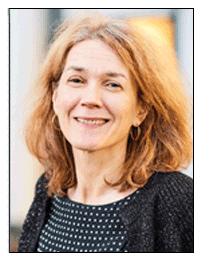 The
last half hour was devoted to PLACI
, which is being mandated in the EU in just a few months. Admittedly
Cargo IMP will not work and operators need at least XML connectivity.
IATA is trying to ensure uniform standards, but “there is still
a lot of work to do. This is in fact a call to action”, concluded
Brendan Sullivan, but in reply to a straight question he confirmed that
the IATA manual will come at a charge. Nicolette van der Jagt (left)
of CLECAT announced a survey on their preparedness and announced a workshop
on 6th of July on the issue, inviting everybody to join in Brussels. The
last half hour was devoted to PLACI
, which is being mandated in the EU in just a few months. Admittedly
Cargo IMP will not work and operators need at least XML connectivity.
IATA is trying to ensure uniform standards, but “there is still
a lot of work to do. This is in fact a call to action”, concluded
Brendan Sullivan, but in reply to a straight question he confirmed that
the IATA manual will come at a charge. Nicolette van der Jagt (left)
of CLECAT announced a survey on their preparedness and announced a workshop
on 6th of July on the issue, inviting everybody to join in Brussels.
Rounding up the meeting on sustainability,
Glyn Hughes gave the TIACA perspective: “not only environment, but
a wider look at sustainability (people, planet and prosperity). TIACA
launched a new product called “Blue
Sky”, a programme launched in March to make self-assessment
in terms of sustainability. Brendan Sullivan confirmed that sustainable
is the only way to grow and “We are pleased to see big forwarders
looking at buying greener flying power.”
James Hookham warned of the increasing pressure
on air freight users. “Air freight starts getting bad scores again,
so we have limited time to clean the sheet, eventually the recognition
of the demonstrable progress will be the convincing argument.” The
Chair’s closing summary concluded a debated that left some of the
participants breathless for its intensity and depth of concepts. Congratulations
to FIATA, an organisation that resonates with value for its own members
and those who are invited to participate.
Let me conclude this long report with FIATA’s
own words, which were provided in the summary received by Members and
I was authorised to quote: “An important take away from the session
was that freight forwarders, if agile and flexible, are here to stay,
as any asset owner who thinks they can replicate the entire global knowledge
bank of a forwarder spanning worldwide logistics options, customs regulations
and cost effectiveness is setting themselves up for failure. The importance
of highlighting the value of air cargo and the role of the freight forwarder
was a recurring topic during the discussions. To the question of what
the key priorities for freight forwarders should be, the speakers noted
the need for continued focus on safety and security, digital connectivity,
eCommerce, and showcasing that freight forwarders are the trouble-shooters
in the supply chain.”
Marco Sorgetti |






